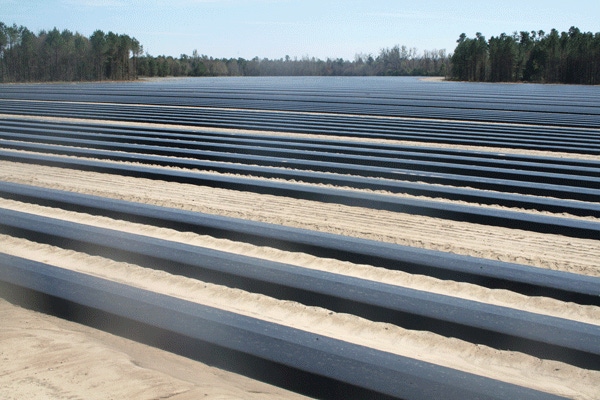
• Workshop attendees will learn how to avoid common and expensive pitfalls, such as under-watering or applying the wrong balance of nutrients.• The workshop will focus on plant tissue sampling, nutrient and water management, and fumigation regulations.• Certified Crop Advisor credits and pesticide recertification credits will be available.
March 10, 2011

The North Carolina Department of Agriculture and Consumer Services is offering a workshop March 30 on the crop production technology of plasticulture.
The training will be held from 1 p.m. to 5 p.m. at Kildee Farms in Ramseur.
The event is free, but registration is required. Call Kent Messick, Field Services Section chief, at (919) 733-2655 by March 25 to register.
Plasticulture, which involves growing crops on plastic with drip irrigation, is a relatively recent practice in North Carolina, starting in the early 1980s on a limited basis.
“Originally, plasticulture was used mainly for strawberry production in North Carolina,” said Agriculture Commissioner Steve Troxler. “Many small farms are beginning to use it for a wider variety of crops because of its potential for profitability and sustainability.”
Plasticulture is radically different from traditional farming. It uses plastic materials, such as film mulches and drip irrigation tape, to moderate the crop production environment. This technology helps crops withstand extreme fluctuations in weather, especially temperature and rainfall. It can also improve produce quality and yield, extend the growing season and optimize use of land and water resources.
Workshop attendees will learn how to avoid common and expensive pitfalls, such as under-watering or applying the wrong balance of nutrients. The workshop will focus on plant tissue sampling, nutrient and water management, and fumigation regulations. Certified Crop Advisor credits and pesticide recertification credits will be available.
The goal of the training is to provide growers and other agricultural professionals with the management skills necessary to transition smoothly from traditional field crop production, Messick said.
“Plasticulture is growing in popularity because of its environmental and economic benefits,” he said. “It is a promising choice for growers who are trying to earn more profit on fewer acres.”
This workshop will be the third offered by the NCDA&CS Agronomic Services Division through a grant from the N.C. Tobacco Trust Fund. Two were held last year. The division decided to offer the additional session to help meet grower demand, Messick said.
You May Also Like



